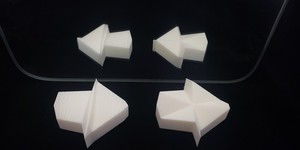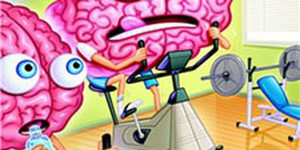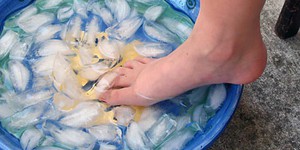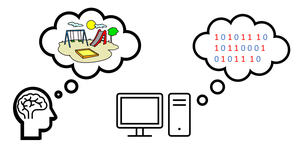Others Like “Pinocchio's Arm: A Lie Detector Test” (top 20 results)
|
Have you ever heard the phrase, "Seeing is believing"? Well, it is more accurate than you might think! In this science project, you can investigate the phenomenon of apparent motion by making your own flip-book animations
Read more
The Science Buddies project Design Your Own 3D Printed Optical Illusion shows you how to make your own 3D printed "anomalous mirror symmetry" illusions (Figure 1). The illusions are based on the work of Dr. Kokichi Sugihara. You can read his original paper about the illusions in the Bibliography.
Figure 1. Two versions of the "impossible arrow" shape that appears to point to the right while its reflection in the mirror appears to point to the left. Which…
Read more
What do you consider creepy? Clowns? Zombies? Video game characters with jerky movement? In 1970, a roboticist by the
name of Masahiro Mori suggested that people are "creeped out" by robots that are almost, but not exactly, humanlike.
He called this phenomena the uncanny valley. But researchers are still exploring and defining the uncanny valley.
In this science project, you can do your own exploration—just try not to creep your friends out too badly!
Read more
"Use it or lose it!" Sure, we all know physical exercise is important to keeping our bodies fit. But how important is physical exercise to your brain? In other words, is there any connection between an active body and increased brain power?
This is an easy project where you can test the effect of exercise on a critical brain function: memory.
Read more
It's fun to go swimming! To feel the power of your body as you launch yourself into the water. But did you know that swimming isn't just about skill and athleticism? The human body consists of skin, contours, and curves. How the water moves along your body and the clothing you are wearing determines how fast you can go. In this science fair project, you will investigate the effects of a force called drag. You will compare the time it takes to swim 25 meters in a swimsuit versus swimming the…
Read more
What do Nolan Ryan, Mark Wohlers, Armando Benitez, and Roger Clemens have in common? These men are all major league baseball pitchers who have pitched baseballs at 100 miles per hour or greater! What does it take to throw a baseball this fast? Does it come down to having the biggest muscles? Can a ball thrown this fast also be accurate? In this sports science fair project, you will learn about the biomechanics of pitching. Investigate how body position and physics interact to produce fast…
Read more
You might have heard the expression, "Take two aspirin, and call me in the morning." What if instead a doctor said, "Play two video games and call me in the morning"? Would you be shocked? Or think it was time for a new doctor? In this science fair project, you'll investigate whether video games, and other forms of mental distraction, have the power to relieve pain.
Read more
What should you eat for breakfast today? What should you wear to school? You make many decisions every day and consider lots of information when making those decisions. What if you could train a computer to make those decisions for you using artificial intelligence? In this project, you will not need to do any computer programming yourself, but you will do some simple math to show how a computer program called a neural network can learn to make decisions.
If you want to try a version of the…
Read more
Some people have a photographic memory and can memorize anything they see almost instantly! Wouldn't that make homework easy? Other people can remember almost anything they hear. Try this experiment to see which type of memory you have.
Read more
Block off one-third of a soccer net with a cone, 5-gallon bucket or some other suitable object. Shoot into the smaller side from a set distance, but systematically varying the angle to the goal line. Take enough shots at each angle to get a reliable sample. How does success vary with angle? For a basic project: How do you think your success rate will vary with angle? Draw a conclusion from your experimental results. A bar graph showing success rate at different angles can help to…
Read more
|
Explore Our Science Videos
How to Build a Brushbot
Build a Simple Electric Motor
Flying Helicopters on Mars - Paper Models













